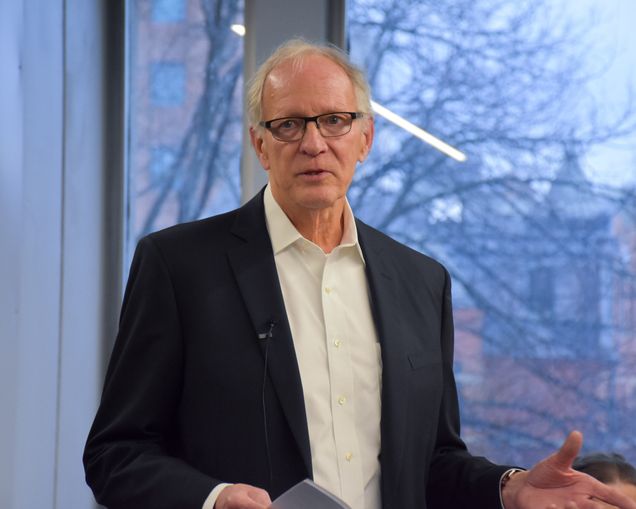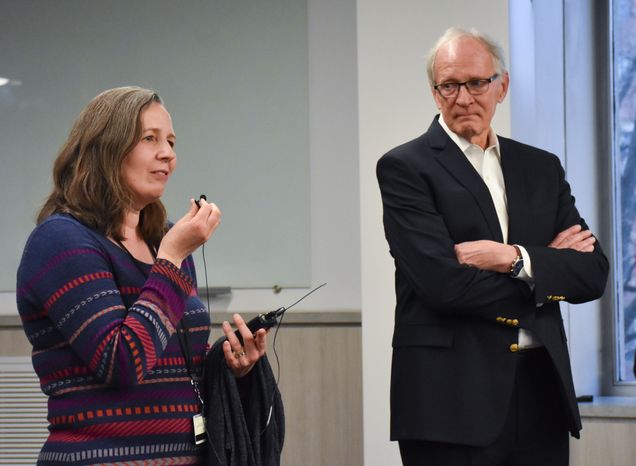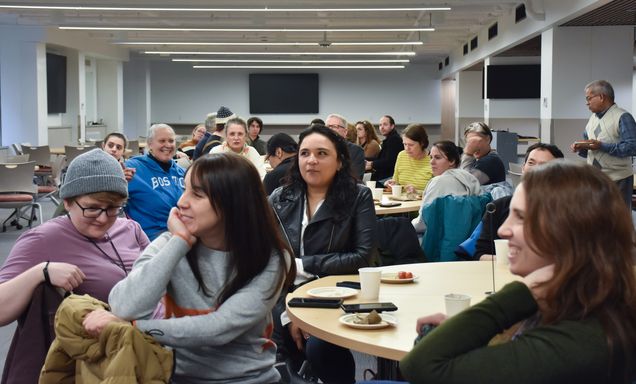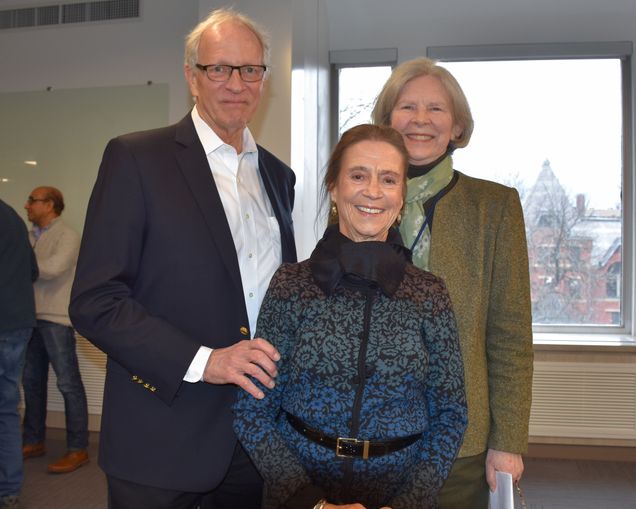Ronald Corley, PhD, Retiring After 30 Years at BU
 Ron Corley, PhD, speaking at his retirement celebration
Ron Corley, PhD, speaking at his retirement celebration
After nearly 30 years at Boston University, Ronald Corley, PhD, will retire on March 1. In January, he stepped down as longtime chair of Virology, Immunology & Microbiology and Rachel Fearns, PhD, took over as the new chair.
At a Jan. 29 retirement gathering, colleagues, faculty, administrators and staff celebrated with Corley, describing him as collegial and respectful, with a caring and calm demeanor that helped him build a strong department of researchers and educators. They praised his instrumental role in bringing the National Emerging Infectious Diseases Laboratories (NEIDL) to fruition.
 Rachel Fearns, PhD, the new chair of Virology, Immunology & Microbiology, addresses retirement reception for Ron Corley, PhD, the former chair
Rachel Fearns, PhD, the new chair of Virology, Immunology & Microbiology, addresses retirement reception for Ron Corley, PhD, the former chair
“He really listens to everybody, it doesn’t matter who it is, whether it’s a student, administrative staff or faculty. He wants everyone to have a voice,” said Fearns, following the celebration. “It really adds up to a collegial atmosphere. You’re all pulling together, you’re all in this as a team.”
Corley told those in attendance that, as he assumed positions of greater responsibility, he learned that effective leaders recruit and retain excellent people, then make their jobs as “friction-free” as possible.
“Everyone’s success is really reflective of the success of everyone else,” he said. “My job is to be supportive and to make sure that everybody else that are part of the organization succeeds.”
 Guests listen to Corley tributes at L-4 reception
Guests listen to Corley tributes at L-4 reception
“When you have a voice, it makes a difference,” said Kathy Marinelli, the department’s administrative assistant. “You feel you’re important and you’re a part of something important.”
Back in 2007, John Connor, PhD, an associate professor in virology, immunology & microbiology and NEIDL investigator, was exploring career opportunities at several institutions. He said he chose BU in large part due to his interactions with Corley.
“He was very personal, very direct in discussing the job opportunity and what his future goals for the department were, in a way that was very transparent, and I felt that he would support me,” said Connor. “That was a very positive experience.”
“What the faculty said today is emblematic of Ron’s generosity of leadership, inclusiveness and guidance,” said Nancy Sullivan, who succeeded Corley as NEIDL director.
Corley was recruited to the university by the late Aram Chobanian, MD, former medical school dean and university president. He was named chair of the microbiology in 1994 (renamed virology, immunology & microbiology) until this year. He served as director of the National Emerging Infectious Diseases Laboratories (NEIDL) from 2014-2022, as NEIDL associate director from 2007-2014 and BUMC associate provost for research from 2009-2014.
Corley’s research focuses on innate and adaptive immunity and how they interact to generate long-lasting protective immune responses. One focus of his laboratory is the immune consequences of infection with highly pathogenic hemorrhagic fever viruses, including filoviruses. He is a member of the American Association of Immunologists, American Society for Microbiology, American Society for Microbiology and Immunology Chairs and was elected a Fellow of the American Association for the Advancement of Science in 2014.
In an interview, Corley said the big change in science at BU over the past 30 years has been the university-wide embrace of collaborative approaches.
“When I came into this field, it was really mostly about an individual doing their science, running their labs,” he said. “Today, it’s much more of a collaborative process of faculty with different skill sets, different backgrounds working together.”
Corley believes this has helped the university retain talent.
“What keeps people here is the sense of excitement, that they are able to build programs that they may not be able to replicate elsewhere,” he said.
The pandemic was the ultimate test and testament of the strength of that collaborative approach, and of the foresight of bringing the NEIDL to BU, one of only two Biohazard Safety Level 4 facilities in an academic setting in the U.S. The competitive relationship between top tier Boston research universities vanished with COVID-19’s massive assault on people and the healthcare system.
Corley recalled Zoom meetings with more than 100 researchers from various institutions and collaborations forming in chatrooms. He took a call from George Daley, MD, PhD, dean of Harvard Medical School, asking for cooperation in researching ways to defeat COVID.
“We had the containment facilities (the NEIDL) and were the only ones who could really work with the authentic virus,” said Corley.
One of the hallmarks of Corley’s career was nearly a decade of work shepherding the NEIDL permitting process in the face of concerns and resistance from the surrounding neighborhoods and skeptical politicians. Right from the start Corley said, “We’re not going to do anything in secret. We’re going to tell people what we are doing.”
Thousands of public officials, media and community members took tours of the building, as well as visiting scientists. Corley always found the time to attend the NEIDL’s Community Liaison Committee (CLC) meetings and give an update as Director of the NEIDL. These updates were on a variety of different topics, including research at BU as well as other public health topics of concern to the community.
“His presence allowed a two-way discussion to take place between community participants and NEIDL researchers and staff,” said Valeda Britton, BUMC’s executive director of community relations.
“I certainly appreciate how the NEIDL has evolved under your direction,” CLC member Norman Stembridge of Roxbury, stated in a letter read at the Jan. 29 event.
“Doing that in a political town like Boston is something to be proud of,” said Stembridge, citing Corley’s efforts to engage community members early and often. “It was no small task, and you handled it well.”
Sullivan said Corley’s low-key and approachable demeanor were critical to getting the doors open.
“I’m so incredibly grateful to Ron for role he played in helping us with the NEIDL over so many years,” said Gloria Waters, BU vice president and associate provost for research. “He did a wonderful job of representing the university.”
 Ron Corley, wife Janice (c), and Dean Karen Antman
Ron Corley, wife Janice (c), and Dean Karen Antman
View all posts